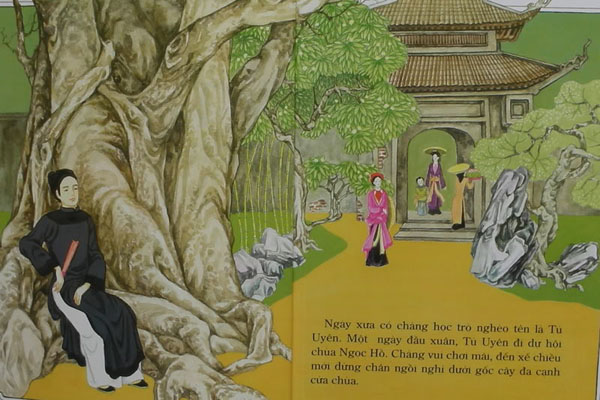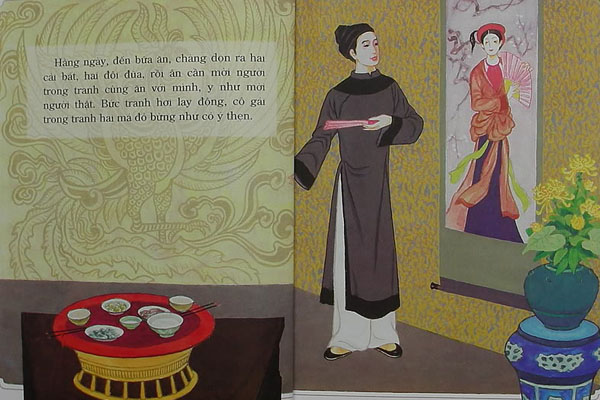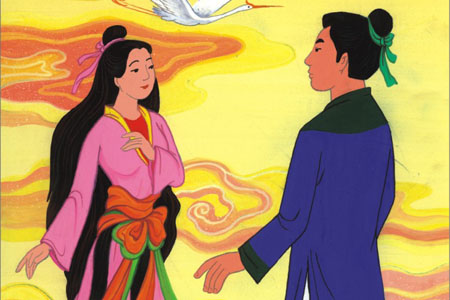In the reign of Le Thanh Tong there lived a very talented student at Bich Cau (Blue Spring), an old suburb of Hanoi well-known for its flowers. As he was an orphan, no woman brightened his poor lodging. Tu Uyen consoled himself by study and poetry.
One day, on returning from a ceremony at Ngoc Ho pagoda, he sat down under a willow to rest. A leaf suddenly fell at his feet. Charming verses were written on it. Tu Uyen was going to reply to it with a poem when a very beautiful young girl surrounded by her attendants, appeared at the end of the lane. She had such a gentle look that the young man was encouraged to dare to tell her how much she disturbed him. Maliciously the young girl replied that the vicinity of a pagoda was not the place to speak of love. And she suddenly disappeared. Tu Uyen understood then that he had met a tien (fairy).

Alas, he had fallen in love. He lost serenity and sleep. Bewitched and despairing at the same time he could only express his languor in his verses. His friend Ha Sinh could not calm him.
The memory of the tien followed him everywhere.
The following spring he decided to go to the genie. He went to the temple of the White Courser to consult the oracles. There he prayed and fell asleep. An old man appeared to him in a dream and said:
"Wait for me tomorrow morning on the East bridge on the To Lich river".
Tu Uyen was at the meeting-place from dawn. To test him the genie made him wait until the evening. Despairing, Tu Uyen was going to return home when an old picture seller offered him a beautiful painting. The young man was going to refuse when casting a glance at the picture, he uttered a cry. It was a portrait of his beloved he looked for in vain. He immediately bought It and took it home.
Then a marvelous time started for the poet. He hung his beloved in his room, in the place of honor, and treated her as if she was alive. At mealtimes he set out two bowls and two pairs of chopsticks. He spoke and recited verses to her.
One autumn evening he thought he saw the tien smiling at him. The following day, what a surprise! On returning from his classes he found the meal already served. The following day he pretended to leave, and hid. He then saw the fairy coming out of the frame. He entered. The tien smoothed her ebony-black hair. Crying with joy he begged her to stay.
The fairy, called Giang Kieu, agreed having come to pay Tu Uyen a debt of love developed during a previous existence. With her hairpin she transformed the hut into a palace with a crowd of servants. Numbers of fairies came down from Heaven to help with the sumptuous wedding festivities.

For three years the happiness of the young husband and wife was unclouded. But, overcome with love and riches, Tu Uyen soon fell into idle ways. He did not study. One night in his drunkenness he hit his wife. When he was sober again, Giang Kieu had disappeared... Tu Uyen could not live without her. He roamed everywhere looking in vain for his beloved.
"Sadly he followed the solitary paths, the winding roads.
But saw only the wind shaking the trees,
And the branches weighed down with dew
Sadly he looked at the immense sea
And saw only a boat sailing away from the coast".
One day in despair he resolved to die.
Finding him punished enough Giang Kieu appeared and forgave him:
‘The guitar is accustomed to chords
Since my love is there, how can the music cease?
Predestined for each other,
The source of love is not dry
The waves always tumultuous.'
They lived in harmony and had a son who succeeded brilliantly in his studies.
Giang Kieu gradually convinced her husband of the vanity of earthly things. And one day, after saying goodbye to their son, they together climbed onto two cranes and flew up to Heaven.
This legend is told in a popular novel in verse, known under the title of "The Marvelous meeting at Bich Cau.'
Today, the neighbourhood of Bich Cau has become Cat Linh street in Hanoi, where the remains of the temple dedicated to Tu Uyen and Giang Kieu still stand. Ngoc Ho pagoda, now called Ba Ngo pagoda. Is situated in Sinh Tu street; the Temple of the White Courser is in the street of the Sails, and Sugar street is on the site of the East Bridge, where the To Lich river was filled in.
This tale conveys the longing to escape from the world of mortals, a tendency preached by popular Taoism.
A story about the origin of Cau Ren, a district of Hanoi, is close enough to the story of Tu Uyen.
Under the Mac (XVI century) a poor student from Kim Lien had nothing to offer to the spirit of his father for the anniversary of his death.
On awaking that night he surprised a fairy in the process of preparing the ritual festival. They got married. After 8 years she returned to Heaven, She revealed to him that he would have a new wife and would live to be ninety-nine years old. At the same time she advised him to plant ren vegetables for years of scarcity were coming. He did so and thus saved many people. The place where he lived is because of that called the Neighborhood of the ren vegetables (O Cau Ren).
Once upon a time there lived in Thanh Hoa formerly Hoan Chau, a young man called Tu Thuc. A son of a mandarin, he was appointed mandarin himself. But he did not like his job, to which he was not equal.
Near the administrative centre there was a pagoda famous for a peony plant, which, at the blossoming season, attracted guests from all corners of the country.
One day, a beautiful girl in her teens broke, by carelessness, one of the branches when she came near to the plant to have a better look at the flowers. The bonzes in charge of the pagoda wanted to detain her, for she had no money about her to pay for the damage she had done. It happened that Tu Thuc was there. He immediately took off his coat and redeemed the girl. All the lookers-on praised him for his generosity.
As Tu Thuc preferred walks and beauty spots to his work, he was reprimanded by his chiefs. Finally he submitted his resignation. Accompanied by a servant and carrying with him a guitar he went to the Tong Son area where he had a house built.
One morning he suddenly saw in the direction of Than Phu a huge lotus flower drawn by multi-colored clouds. He set off alone, by boat. When he arrived at the foot of a very high mountain, he moored his boat and started climbing the mountain.
A grotto opened up in front of him. Hardly had he entered it when the rock closed on him. He walked in the dark, groping his way along an underground torrent, towards a light which he spotted from a distance. When he was out in the open, he found himself standing in front of a higher mountain with steep slopes. He climbed, sticking to the crevices of the rock. At the top, the air was purer and the sky more beautiful than anywhere else.
Tu Thuc saw, in the distance, palaces surrounded by trees. He took the path which led to the palaces. Suddenly two young girls dressed in sky blue ran up to meet him, whispering: ’Our bridegroom has arrived". And they led him to one of the most beautiful houses.
"Our mistress invites you to come in".
The dazzled young man followed them into a rose and violet palace with brocade hangings and blue marble staircases. Having climbed one storey of ruby and one of jade, Tu Thuc found himself face to face with a tien dressed in white silk, seated on a bed inlaid with seven kinds of precious stone. He took his seat on a santal chair.
"You who have known many extraordinary places, what do you think of this one?"
Tu Thuc answered:
"I didn't know that such a wonder existed".
The tien continued with a smile:
"How could you know this place? We are in the sixth of the thirty six grottos of the Phu Lai mountains. As for me, I am the tien of Nam Nhac Mount. I invited you to come over here because I knew you are a virtuous man".
She ordered a servant to go and fetch a young girl: it was the one who had broken the branch of peony
'My younger sister is called Giang Huong", said the lady. “You saved her one day. To thank you, I give you her hand in marriage.’
Soon the wedding banquet was prepared. Tu Thuc lived for nearly one year at the palace, but he felt nostalgia for his small hut at the foot of the mountain. One day he told his wife:
’I wish to see my family and village again".
Some more links for Tour Vietnam Cambodia or Tour in Laos here
As Giang Huang hesitated, Tu Thuc added:
’I'll stay there for only some time and will come back to you before long".
She answered with tears in her voice:
"I don't want to abuse your affection, but you should know that in the world of mortals the months and days are very short and I'm afraid you'll find nothing of what you have left".
She handed him a letter, and recommended him to open it once he arrived home. The tien had a cloud chariot made for him, which carried him onto the earth.
Sure enough, Tu Thuc did not recognize anybody. The landscapes had changed too.
He questioned an old man.
"I remember that", answered the old man, 'when I was a little boy, I heard people say that my great-grandfather who bore the same name as you had been lost in the mountain. It was nearly two hundred years ago".
Tu Thuc wanted to take again his chariot, but the latter had turned into a phoenix and had disappeared. Then, sadly he opened Giang Huong's letter and read:
"Alas! The marriage ties twisted in the world of the tien have been broken forever".
Then Tu Thuc set off for the mountain and nobody ever saw him again.
Main source: Thinh van di luc.
The theme of the lost Paradise is equally found in the famous Chinese tale of the Land of Thien Thai where two scholars. Liu and Yuan, under the Han dynasty, lost their way (a story extolled by poets of the Tang epoch).
Some works of western literature bear some resemblance to this tale, for example Rip Van Winkle by Washington Irving.



